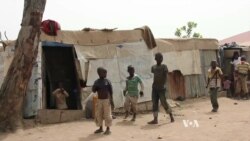In its five-year effort to impose Islamic law in northeastern Nigeria, the Boko Haram extremist group has killed thousands of people and forced hundreds of thousands to flee. Some of those who ran for their lives now live in squalor on the edges of the capital, Abuja.
Shanties made of old sacks and pieces of wood are now home for people who fled Gwoza, a town in Nigeria’s Borno State. Boko Haram overran the town earlier this year and declared it part of a caliphate.
Some of the people from Gwoza went to a settlement called Sabon Kuchigora on the outskirts of Abuja, joining relatives who already lived in the capital.
Many tell tales of fleeing Boko Haram violence. Few have any idea what has become of their hometown, says Alhaji Usman Adamu.
"The houses are burnt, there is nobody. Everybody has run to mountains where they're struggling or trying to see how they can escape from the mountain," Adamu said. "Those who succeeded in escaping went to Cameroon where they also suffered hunger and they hardly got food, so they had to leave.”
'No way I can go back'
Nigeria's National Emergency Management Agency (NEMA) has registered more than 868,000 people displaced by fighting in the northeast. Other estimates increase that number up to 1.5 million.
NEMA has distributed food and other supplies to people it registered, but it is not sure how many fled to the Federal Capital Territory because many have integrated into local communities.
Some displaced people, who have taken over a half-completed house outside of Abuja, say they face harassment from the local police and military who are suspicious they might be collaborating with Boko Haram.
People like these are stuck, says Ishaya Isa Chonoko of the emergency management agency.
“They are not happy staying here. They too want to go back. But amidst this crisis, honestly, they will not want to go back until peace is restored in their places,” Chonoko said.
Establishing peace may not be easy. Boko Haram continues to carry out bombings in major cities in the northeast and capture territory in Borno and neighboring Adamawa state.
Many of the people in Sabon Kuchigora speak of deep trauma from fleeing Boko Haram. Some have gunshot wounds. Others lost family members.
Elizabeth Yohana says she won't try to return home.
“Even if there is military, are they going to be there permanently, forever? Now, we don’t have houses, we don’t have food," she said. "There is no way I can go back.”
For now, the people of Sabon Kuchigora can only wait and try to make a living, far from home.









